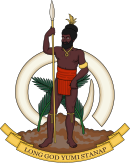 |
|---|
The 46 members of the Parliament of Vanuatu from 1987 to 1991 were elected on 30 November 1987.
 |
|---|
The 46 members of the Parliament of Vanuatu from 1987 to 1991 were elected on 30 November 1987.
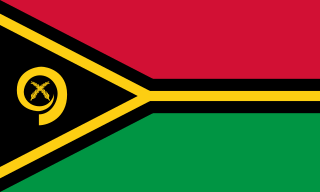
Vanuatu, officially the Republic of Vanuatu, is an island country in Melanesia, located in the South Pacific Ocean. The archipelago, which is of volcanic origin, is 1,750 km (1,090 mi) east of northern Australia, 540 km (340 mi) northeast of New Caledonia, east of New Guinea, southeast of Solomon Islands, and west of Fiji.
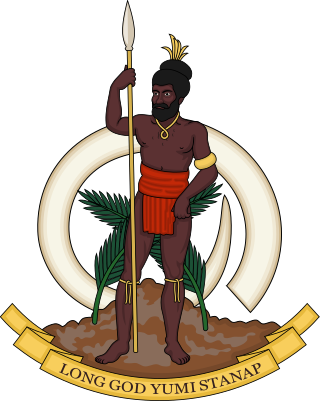
The politics of Vanuatu take place within the framework of a constitutional democracy. The constitution provides for a representative parliamentary system. The head of the Republic is an elected President. The Prime Minister of Vanuatu is the head of government.

Vanuatu maintains diplomatic relations with many countries, and it has a small network of diplomatic missions. Australia, France, Japan, New Zealand, the People's Republic of China, South Korea and the United Kingdom maintain embassies, High Commissions, or missions in Port Vila. The British High Commission maintained a continued presence for almost a century, though closed from 2005 until reopening in 2019.
The Legislative district of Malabon–Navotas was the combined representation of the Metropolitan Manila municipalities of Malabon and Navotas in the lower house of the Congress of the Philippines from 1987 to 2010.
The legislative district of Tawi-Tawi is the representation of the province of Tawi-Tawi in the various national legislatures of the Philippines. The province is currently represented in the lower house of the Congress of the Philippines through its lone congressional district.

General elections were held in Vanuatu on 2 September 2008. In July the Melanesian Progressive Party requested that they be postponed, contesting the constitutionality of the Peoples Representation Act No. 33 of 2007, which allegedly enabled voters in certain constituencies to vote in two constituencies. The Principal Electoral Officer, Martin Tete, confirmed that the election would take place on 2 September, as scheduled. The day was declared a national holiday, to encourage people to vote.

The French Republic and the Republic of Vanuatu have long-standing bilateral relations which have varied over the years between tense and amicable. Vanuatu, then known as the New Hebrides, was a Franco-British condominium from 1906 to 1980, and maintained formal relations with both of its former colonial masters after gaining independence. Franco–Vanuatuan relations were rocked by a series of crises in the 1980s, and broke down completely on several occasions, with Vanuatu expelling the French ambassador in 1981, in 1984 and in 1987. Relations improved from the 1990s onwards and, today, France provides development aid to Vanuatu. The two countries also share amicable economic and cultural relations; both are members of the Organisation internationale de la Francophonie.

The Republic of Vanuatu and the Union of Soviet Socialist Republics established official diplomatic relations on June 30, 1986 - three months to the day before Vanuatu established diplomatic relations with the United States. With the dissolution of the Soviet Union in 1991, the Russian Federation emerged as its successor state in 1991.
The 1978 Constitution of Sri Lanka provides for the election of members of Parliament from 22 multi-member electoral districts through the proportional representation electoral system.

General elections were held in Vanuatu on 2 December 1991. Ni-Vanuatu voters were invited to elect the 46 members of the national Parliament.

The Vanuatu passport is an international travel document issued to Vanuatu citizens.

Four by-elections to the Parliament of Vanuatu were held in 2009 to fill seven vacant seats.
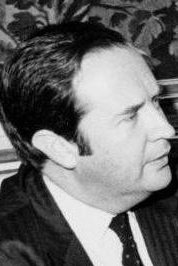
The 1987 Canarian regional election was held on Wednesday, 10 June 1987, to elect the 2nd Parliament of the Autonomous Community of the Canary Islands. All 60 seats in the Parliament were up for election. The election was held simultaneously with regional elections in twelve other autonomous communities and local elections all throughout Spain, as well as the 1987 European Parliament election.

General elections were held in Vanuatu on 22 January 2016. The previous elections occurred in October 2012. The president of Vanuatu, Baldwin Lonsdale, dissolved the Parliament of Vanuatu in November 2015. This occurred after the conviction of 14 parliamentarians for bribery. The convicted MPs include former Prime Ministers Serge Vohor and Moana Carcasses Kalosil. The president called for a snap election to form a new government.

General elections were held in Vanuatu on 19–20 March 2020. The elections were initially intended to be held on 19 March, but logistical problems resulted in some areas voting the following day.
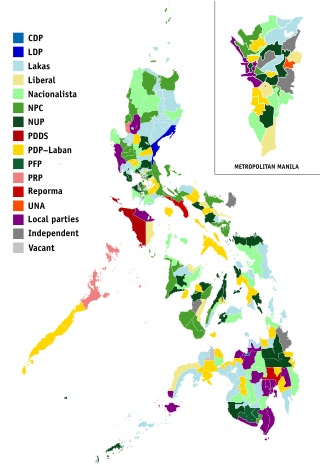
Congressional districts of the Philippines refers to the electoral districts or constituencies in which the country is divided for the purpose of electing 253 of the 316 members of the House of Representatives. The country is currently divided into 253 congressional districts, also known as legislative districts or representative districts, with each one representing at least 250,000 people or one entire province. The 1987 Constitution of the Philippines initially provided for a maximum 200 congressional districts or 80 percent of the maximum 250 seats for the lower house, with the remaining 20 percent or 50 seats allotted for sectoral or party-list representatives. This number has since been revised with the enactment of several laws creating more districts pursuant to the 1991 Local Government Code.
Tarlac's at-large congressional district is an obsolete electoral district that was used for electing members of Philippine national legislatures in Tarlac before 1987.
Nueva Ecija's at-large congressional district was the provincewide electoral district of Nueva Ecija for Philippine national legislatures before 1987.